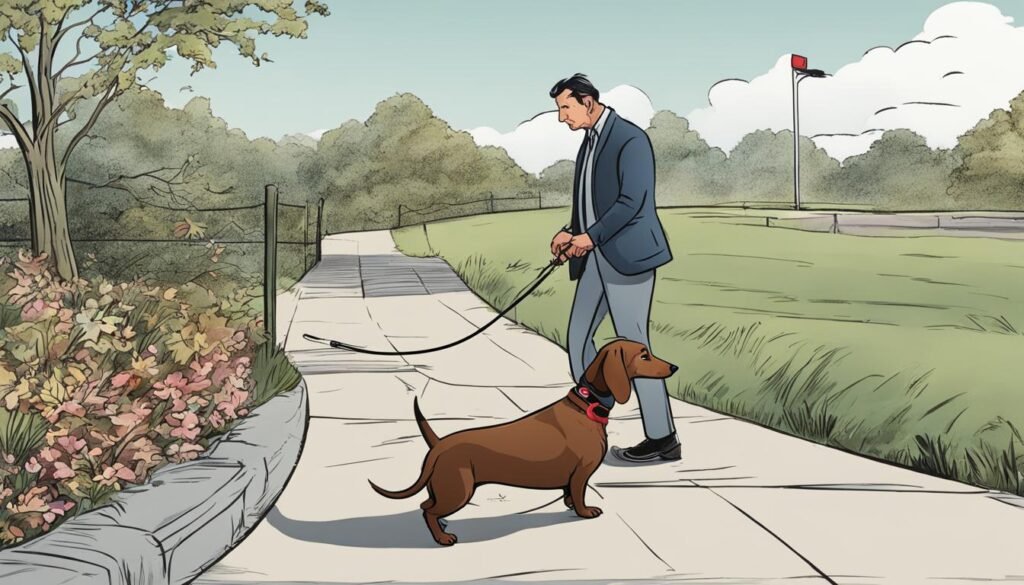Despite their popularity, some people believe that dachshunds are the worst breed of dogs. Let’s explore the reasons behind this opinion and delve into the unique characteristics of the dachshund breed.
Key Takeaways:
- Dachshunds have a reputation for being stubborn and challenging to train.
- The breed’s hunting background can lead to behavior concerns and aggression.
- Dachshunds are prone to health issues, particularly related to their back and spine.
- They require constant attention, exercise, and mental stimulation to prevent barking and destructive behavior.
- Despite the challenges, dachshunds can be fiercely loyal and make great companions with proper training and socialization.
Dachshund Temperament Issues and Behavior Concerns
Dachshunds have a reputation for their unique temperament and behavior traits that can sometimes pose challenges for owners. Understanding these issues can help prospective owners make informed decisions about whether a dachshund is the right breed for them.
One of the most significant temperament issues of dachshunds is their stubbornness. They are independent thinkers and may not always comply with commands or training efforts. This stubborn streak can make training a dachshund more time-consuming and require patience and consistency from the owner.
Dachshunds have a high prey drive, which means they are naturally inclined to chase after small animals such as squirrels or birds. This can lead to behavior concerns around other animals, especially if not properly socialized or trained. It is essential for owners to manage this instinct and provide appropriate outlets for their dachshund’s energy and hunting drive.
Additionally, dachshunds are prone to separation anxiety, a condition where they experience distress and anxiety when left alone. This can result in destructive behavior, such as chewing furniture or excessive barking. Proper socialization, crate training, and gradually increasing the time spent alone can help alleviate separation anxiety in dachshunds.
Common Health Problems of Dachshunds
Dachshunds, despite their popularity, are prone to a variety of health problems. Their unique body structure, characterized by long backs and short legs, puts them at a higher risk for certain health issues. One common health problem dachshunds face is Intervertebral Disk Disease (IVDD), which affects their spinal discs and can cause paralysis. This condition often requires expensive surgeries to treat.
Weight gain is also a common issue among dachshunds. Their long bodies make them prone to obesity, which can lead to further health complications such as joint problems and diabetes. Additionally, dachshunds are susceptible to dental issues, such as gum disease and tooth decay. Regular dental care, including brushing their teeth and providing dental chews, is crucial for their oral health.
In summary, dachshunds have a higher risk for certain health problems due to their unique body structure. It is important for dachshund owners to be aware of these common health issues and take preventative measures, such as regular exercise, weight management, and dental care, to ensure their dachshund’s well-being.
Dachshund Training Challenges and Managing Aggression
Training a dachshund can present unique challenges due to their independent nature and strong hunting instincts. These intelligent dogs require consistent, patient, and positive reinforcement-based training methods to overcome their stubbornness and focus their energy on appropriate behaviors. Adequate socialization from an early age is also crucial in preventing aggression towards other dogs and humans.
“Dachshunds can be smart yet independent, making training a challenge,” says dog behavior expert Jane Smith. “Their natural hunting instincts can make them reactive and easily distracted.” It’s important to provide them with mental stimulation and engaging activities to prevent boredom and destructive behaviors. Puzzle toys and interactive games can help redirect their focus and keep them engaged.
To manage dachshund aggression, early socialization and exposure to various environments are essential. Gradual introductions to new people, dogs, and experiences can help prevent fear-based aggression. Consistent and firm leadership, coupled with positive reinforcement training, can also help establish a strong bond and build trust with your dachshund.
Effective Training Techniques for Dachshunds:
- Start training early: Begin training your dachshund as soon as you bring them home. Early training sets the foundation for good behavior.
- Use positive reinforcement: Reward your dachshund with treats, praise, and play whenever they exhibit the desired behavior. This encourages them to repeat the behavior in the future.
- Be patient and consistent: Dachshunds may take longer to learn commands, so patience and consistency are key. Use short training sessions and break tasks into small, manageable steps.
- Focus on mental stimulation: Keep your dachshund mentally engaged with puzzle toys, scent games, and obedience training exercises. This helps tire them out and prevents boredom-related behavioral issues.
- Seek professional help if needed: If you’re struggling with training or managing aggression, consider consulting a professional dog trainer or behaviorist who specializes in dachshunds.
With proper training, socialization, and management, dachshunds can overcome their training challenges and aggression tendencies. Remember that each dachshund is unique, and patience, understanding, and positive reinforcement go a long way in building a strong bond with your adorable wiener dog.

Dachshund Breed Drawbacks
While dachshunds have their charms, potential owners should also be aware of the drawbacks associated with this breed. It’s important to consider these factors before bringing a dachshund into your home.
First, dachshunds require constant attention and regular exercise. They are an active breed that loves to explore and play. Without adequate mental and physical stimulation, they may become bored and resort to destructive behaviors, such as chewing on furniture or excessive barking.
Additionally, dachshunds can be prone to excessive barking. They have a strong instinct to alert their owners of perceived threats or changes in their environment. While this can be beneficial as a watchdog behavior, it can become a nuisance if not properly managed and trained.
“Dachshunds have a unique body structure that puts them at a higher risk for certain health problems.”
Dachshund Grooming Requirements
- Regular brushing to keep their coat clean and prevent matting.
- Regular nail trimming to prevent discomfort and injury.
- Regular dental care to maintain oral health.
Lastly, grooming a dachshund can be a time-consuming task. Their unique coat requires regular brushing to keep it clean and prevent matting. They also have long nails that need to be trimmed regularly, and their teeth require regular dental care to maintain oral health. Prospective owners should be prepared to devote time and effort to their dachshund’s grooming needs.
In spite of these drawbacks, dachshunds can still make loving and loyal companions for those who are prepared to meet their specific needs. Responsible ownership, proper training, and socialization can help mitigate potential challenges and ensure a fulfilling relationship with your dachshund.
The Benefits of Owning a Dachshund
Despite the challenges associated with dachshunds, owning one of these adorable dogs can bring numerous benefits and joys to your life. Here are some positive aspects of dachshunds that make them beloved pets:
- Fierce Loyalty: Dachshunds are known for their unwavering loyalty to their owners. Whether you’re taking a walk, lounging on the couch, or simply going about your daily activities, your dachshund will always be by your side, providing constant companionship and affection.
- Great Watchdogs: Dachshunds have a keen sense of alertness and make excellent watchdogs. Their acute hearing and protective nature make them quick to alert their owners of any potential threats or unusual activities, ensuring a sense of security in your home.
- Compatibility with Other Dogs: Contrary to popular belief, dachshunds generally get along well with other dogs. They are social animals and can adapt well to living with furry siblings. With proper socialization and training, dachshunds can form strong bonds with both humans and their four-legged friends.
- Minimal Shedding: If you’re concerned about excessive shedding, dachshunds may be the perfect breed for you. They have short, smooth coats that require minimal grooming and shed less compared to other breeds, making them a great choice for those with allergies or a preference for a cleaner living environment.
These are just a few of the many positive aspects of owning a dachshund. Their unique personalities and endearing qualities make them cherished companions and loyal friends. While it’s important to understand the challenges that come with dachshunds, the rewards of their companionship far outweigh the difficulties.

The Joy of Dachshund Companionship
One dachshund owner, Sarah, shares her experience: “I can’t imagine life without my dachshund, Max. He brings so much joy and laughter into my home. Despite his occasional stubbornness, Max is incredibly loving and always knows how to cheer me up. His loyalty and protective nature make me feel safe, and his playful antics never fail to put a smile on my face. I wouldn’t trade my dachshund for anything!”
In conclusion, dachshunds may have their quirks and challenges, but the benefits of owning one are immeasurable. Their loyalty, watchfulness, compatibility with other dogs, and minimal shedding make them wonderful companions for individuals and families alike. If you’re willing to invest time and effort in training, socialization, and meeting their needs, owning a dachshund can be an incredibly rewarding experience.
Choosing a Dachshund and Responsible Breeding
Dachshunds are undeniably adorable, and if you’ve decided to bring one into your home, it’s essential to make an informed choice. Responsible dachshund ownership starts with selecting the right dog and ensuring that they come from a reputable breeder. By considering adoption from shelters, you not only give a deserving dog a second chance at a loving home, but you also help alleviate overpopulation and reduce the number of dogs in need of homes.
When choosing a dachshund, it’s important to find a breeder who prioritizes the health and well-being of their dogs. Responsible breeders carefully select parent dogs with good temperaments and health histories to minimize the risk of inherited conditions. They also provide proper care and socialization for their puppies, setting them up for success in their new homes.
Responsible breeders follow ethical practices, such as breeding dogs at appropriate ages and limiting the number of litters per female. They prioritize the health and welfare of their dogs over financial gain, ensuring that each puppy receives the attention and care it deserves. By choosing a responsible breeder, you can have peace of mind knowing that your dachshund is more likely to have a healthy and well-adjusted temperament.
Remember, responsible dachshund ownership goes beyond selecting the right dog. It also involves providing proper care, training, and socialization throughout their lives. By being a dedicated and responsible owner, you can forge a strong bond with your dachshund and create a happy and fulfilling life together.
Are Dachshunds Really the Worst Breed?
Despite the negative reputation some people attribute to dachshunds, it’s important to recognize that they are not inherently the worst breed. Like any other breed, dachshunds have their own unique characteristics and requirements that may not suit everyone’s lifestyle. By understanding these traits and being prepared for them, dachshund owners can enjoy fulfilling and rewarding relationships with their furry companions.
Dachshunds are known for their stubbornness and tenacity, which can make them challenging to train. However, with consistent and positive reinforcement training methods, their intelligence can shine through, and they can become obedient and well-behaved companions. Socializing them from an early age is also key to preventing aggression towards other animals and humans.
While dachshunds have some health concerns, such as back and spine issues, responsible breeding practices can mitigate these risks. Prospective owners should seek reputable breeders who prioritize the health and temperament of their dachshunds. Additionally, regular exercise, weight management, and dental care can help maintain their overall well-being.
In conclusion, dachshunds are not the worst breed, but rather a unique breed that requires understanding and commitment from their owners. With responsible ownership, proper training, and socialization, dachshunds can be loyal, loving, and wonderful companions. So, before labeling them as the worst breed, let’s take the time to appreciate their individuality and the joy they bring to many households.
FAQ
Are dachshunds really the worst breed of dogs?
No, dachshunds are not inherently the worst breed. Each dog has unique characteristics and requirements, and dachshunds can be wonderful companions for those who understand and are prepared for their specific needs.
What are some common temperament issues and behavior concerns with dachshunds?
Dachshunds are known for their stubbornness and tenacity, which can make them challenging to train. They can also have a high prey drive, leading to issues around other animals. Additionally, dachshunds are prone to separation anxiety and may exhibit destructive behavior if they feel neglected or jealous.
What are the common health problems of dachshunds?
Dachshunds have a unique body structure that puts them at a higher risk for certain health problems, particularly related to their back and spine. Intervertebral Disk Disease (IVDD) is a common condition in dachshunds, which can lead to paralysis and require expensive surgeries. They are also prone to weight gain and dental issues.
How can I manage dachshund aggression and training difficulties?
Dachshunds can be smart but independent, making training a challenge. Their hunting background can lead to reactive behavior and difficulty in redirecting their focus. They can also display aggression towards other dogs or humans if not properly socialized and trained.
What are the drawbacks of owning a dachshund?
Prospective dachshund owners should be aware of the breed’s drawbacks, including the need for constant attention and regular exercise. They are also prone to excessive barking and can be destructive if not stimulated mentally and physically. Additionally, the grooming requirements of dachshunds should be considered.
What are the benefits of owning a dachshund?
Despite the challenges, there are positive aspects to owning a dachshund. They are fiercely loyal and make great companions. Dachshunds can be excellent watchdogs and generally get along well with other dogs. They also have minimal shedding compared to other breeds.
How can I choose a dachshund and ensure responsible breeding?
Prospective dachshund owners should consider adoption from shelters to help alleviate overpopulation and reduce the number of dogs in need of homes. Responsible breeding practices, including ensuring good temperament and breeding at appropriate ages, can minimize potential health and behavior issues in dachshunds.
So, are dachshunds really the worst breed?
No, dachshunds are not the worst breed. Despite their unique characteristics and potential challenges, they can make wonderful companions for those who understand and accommodate their specific needs through responsible ownership, proper training, and socialization.

